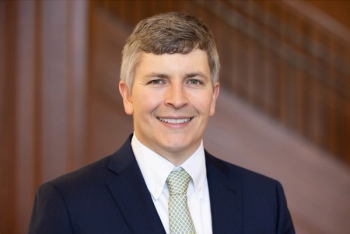
Taking Ownership of Your Career Path: Drew Otoo, Merck
Dr. Andrew (Drew) Otoo talks about how pharma employees can elevate their own value propositions.
In this installment of the Harvard Business School Healthcare Alumni Association (HBSHAA) Q&A series, Michael Wong speaks to Dr. Andrew (Drew) Otoo, PharmD, Vice President of Marketing at Merck, about how pharma employees can elevate their own value propositions.
Michael Wong: As multinationals accelerate their digital transformations, what is the path forward for employees? According to Heidrick & Struggles’ recently published survey of healthcare and life sciences’ executives, “leaders are prioritizing customer experience and digitization for 2021, and culture, talent, and leadership have taken a backseat.”1 Moreover this 4th annual survey revealed, “When asked to express their levels of confidence in their leaders across various critical areas in the organization, talent management ranked last, with only 17% of leaders saying they are very confident they have the talent leadership they need. In that light, it is concerning that, overall, investment in superior talent and leadership as a priority has fallen from 70% in 2020 to 43% in 2021.” With this type of prognosis, what should employees be doing to strengthen their own career employability if their own employers are not investing in them?
Drew Otoo: Candidly, I was quite surprised by these findings since the very core of a company is its people and mission. And besides the importance of treating coworkers with dignity and respect and investing in their potential, numerous research findings point to the economics between elevated employee engagement and shareholder value.2 Still, perhaps it’s because some of these leaders have seen how digital transformation has performed during this pandemic; where for some areas, business hasn’t skipped a beat. As a result, they might believe there is more value in investing in technology versus people.
Still for me, the beating heart of an organization is its workforce. Having a mission and purpose which is ultimately brought to life by a strong culture can mitigate the risk of being unmoored and lost, without direction. At Merck, a guiding principle I often call upon for personal and team reflection is our mission: to discover, develop, and advance innovative medicines and vaccines that save and improve lives around the world. Especially now as we transition out of the pandemic, companies should be investing in their people. If it’s clear that your C-suite is prioritizing its limited resources on its workforce, count yourself fortunate and leverage available programs such as tuition reimbursement and other programming. If your company’s situation is different, determine how you can shape your own destiny. In one of my expatriate roles, it was amazing to see how a simple step of working one-on-one with individuals to craft their respective personal development plans uncovered a new sense of energy from them in terms of a curiosity of what might be, a winning growth mindset and a frank self-realization of how one’s success is ultimately dependent upon one’s personal accountability… No excuses.
To take action, one common solution that I used during both of my expat assignments (in France and Japan), as well as my most recent role here at Merck, is the deployment of professional coaches. By engaging with an outsider to help facilitate these candid conversations, it was helpful to have a third party who didn’t have the organizational constraints that come with being a co-worker. In all three transformations, the teams exceed their overall commercial remits. So, if you have limited resources, then I would allocate funding for such a coaching deployment versus just another AI-Proof of Concept! And if you’re with a severely constrained resourced employer or not in a managerial role with budget, then be creative and tap into perhaps a personal coaching engagement with your school’s alumni office or a local alumni chapter where there are sometimes experienced/retired executives who are willing to mentor. But again, you need to take ownership of your own career path.
With the Heidrick & Struggles survey revealing technology (artificial intelligence, big data, digital, wearables, and consumer genomics) as the most external disruptive factor to organizations and required remote or hybrid working environments as the most internal disruptive element, what should employees be doing to elevate their personal value propositions to current and prospective employers?
First, sketch out a personal roadmap of where you would like to be in five years and what that ultimate job might require in terms of skill sets. You may not need to be a software engineer, but you might still take a course such as MIT’s AI — Implications for Business Strategy. Second, be intentional with managing your energy, and notice how I reference the word, “energy,” not time. A HBR article referenced how the core problem with working hours is that time is a finite resource.3 Instead the article posed how energy is a different story since like a battery, we need to recharge. So, be intentional with your energy to take on new challenges without depleting the energy for all of your commitments including work, family, friends, community, and self.
Finally, since no one can really predict what the new daily operating model will be (WFH, Hybrid, Back in the Office,etc.), just “OWNIT!”
About Dr. Andrew (Drew) Otoo, PharmD
Dr. Otoo is a Vice President of Marketing at Merck where his current strategic remit is advancing global pneumonia disease prevention. He has over 20 years of experience working in the bio-pharma industry (Merck, Pfizer, Nabi BioPharmaceuticals, Eli Lilly, and Schering Plough) as well as pharmaceutical management consulting (Campbell Alliance, now Inventiv Health).
Michael Wong is an Emeritus Board Member of the Harvard Business School Healthcare Alumni Association.
Notes
1. Disruption in Healthcare and Life Sciences 2021, Heidrick & Struggles, February 2, 2021.
2. Edmans, Alex, 28 Years of Stock Market Data Shows a Link Between Employee Satisfaction and Long-Term Value, Harvard Business Review, March 24, 2016.
3. Schwartz, Tony and McCarthy, Catherine, Manage Your Energy Not Your Time, Harvard Business Review, October 2007.
4. https://www.linkedin.com/pulse/culture-mattersand-key-growth-driver-ian-c-read/
Newsletter
Lead with insight with the Pharmaceutical Executive newsletter, featuring strategic analysis, leadership trends, and market intelligence for biopharma decision-makers.




